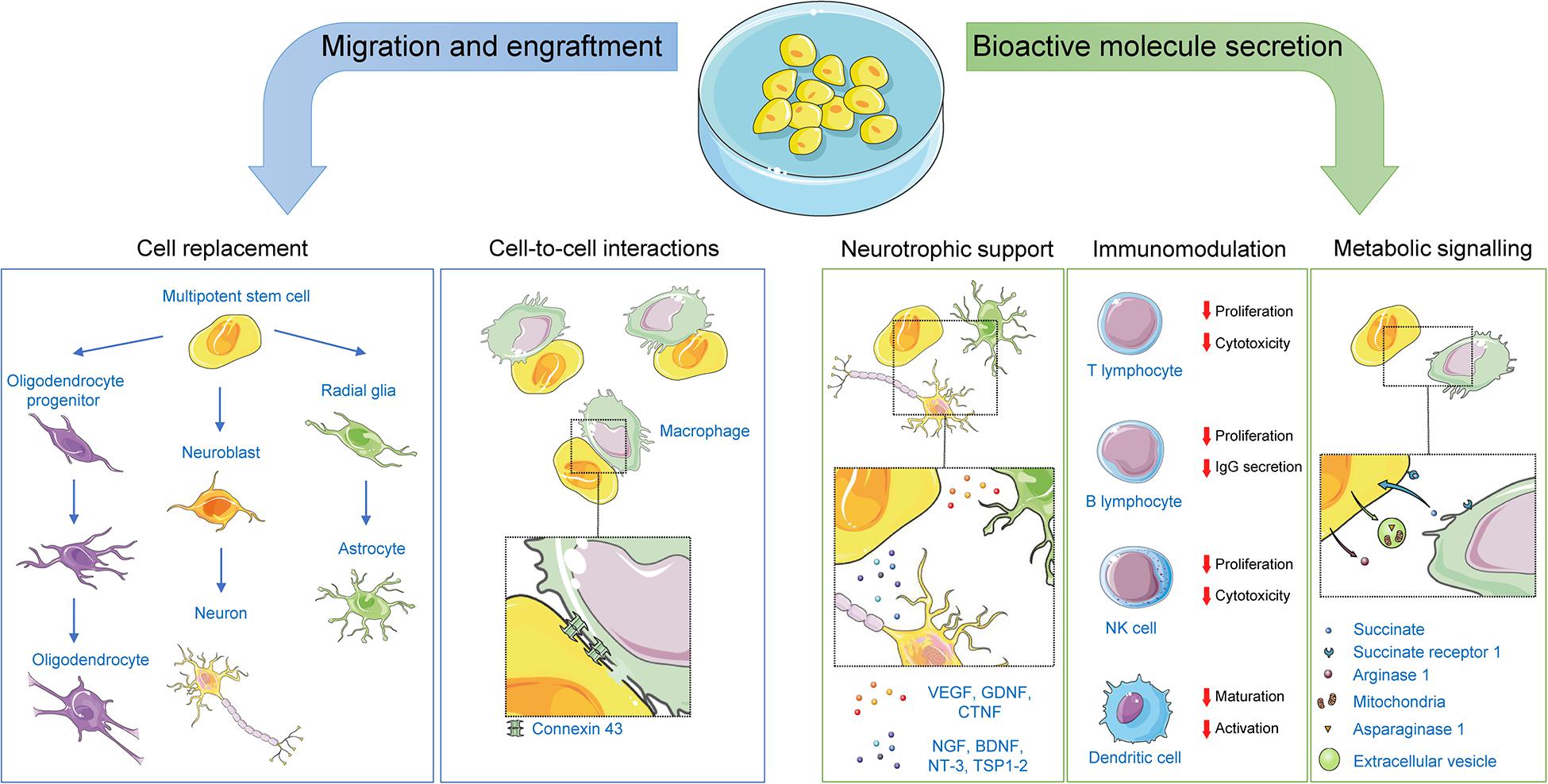7 Simple Techniques For Regenerative Medicine For Multiple Sclerosis
Unknown Facts About Regenerative Medicine For Multiple Sclerosis
Table of ContentsRegenerative Medicine For Multiple Sclerosis Can Be Fun For AnyoneHow Regenerative Medicine For Multiple Sclerosis can Save You Time, Stress, and Money.What Does Regenerative Medicine For Multiple Sclerosis Mean?See This Report on Regenerative Medicine For Multiple SclerosisGetting The Regenerative Medicine For Multiple Sclerosis To WorkNot known Details About Regenerative Medicine For Multiple Sclerosis See This Report about Regenerative Medicine For Multiple Sclerosis
The mesenchymal stem cells transplanted throughout stem cell treatment can divide and develop to create new cells that can fill in the damaged cells of the worried cells. This could recover neurological functions in clients with this condition. These benefits of stem cell therapy are further sustained by the ability of MSCs to promote recovery.Clients with numerous sclerosis are usually treated with mesenchymal stem cells. These are multipotent stem cells that have the capability to differentiate and develop to create a vast array of cell types in the body. Once transplanted, these stem cells can establish to develop healthy and balanced afferent neuron hence supporting the regeneration of the damaged tissues of the nerve system.
Once hair transplanted, the stem cells migrate to locations of swelling or damage within the central nerves (CNS). They are naturally drawn in to the sites of injury where the immune system is attacking the myelin sheath, the protective covering of nerve fibers. The stem cells work by advertising the repair and regeneration of harmed myelin, possibly bring back function to affected nerve cells.
Regenerative Medicine For Multiple Sclerosis for Beginners
Stem Cell Research on MS The National Multiple Sclerosis Culture, along with other organizations, is proactively funding and supporting research study into mesenchymal stem cell therapy for several sclerosis to discover their possible and boost therapy protocols. The goal is to establish much safer and a lot more efficient ways to utilize stem cells in treating MS.
Get This Report on Regenerative Medicine For Multiple Sclerosis
Here are reviews from evaluations of individuals Swiss Medica clinic. The person traveled from Romania seeking treatment for MS after hearing positive responses about stem cell therapy for the illness.
Obtain a complimentary online appointment to discover how stem cells will work for your case, and what are the duration and expense of the therapy. Uccelli, A., Laroni, A., Brundin, L., Clanet, M., Fernandez, O., Nabavi, S. M. Regenerative Medicine for Multiple Sclerosis., Muraro, P. A., Oliveri, R. S., Radue, E. W., Sellner, J., Soelberg Sorensen, P., Sormani, M. P., Wuerfel, J. T., Battaglia, M
Stem cells are cells in the body that can mature into grow cells that serve an offer function. There are two main kinds of stem cells: embryonic stem cells and adult stem cells.
are found in some grown-up cells and organs consisting of the bone marrow, skin, blood, and brain. Adult stem cells are not as adaptable as beginning stem cells and are therefore more minimal in terms of the kinds of cells they mature into. The one-of-a-kind properties of stem cells supply pledge for brand-new therapies that can slow/halt MS disease task and read review repair work tissue damage in the main nerve system.
Some Ideas on Regenerative Medicine For Multiple Sclerosis You Should Know

The treatment entails gathering stem cells from an individual's own (autologous) bone marrow. The person is then treated with chemotherapy to deplete the body immune system and stem cells are reestablished right into the body where they grow into brand-new, healthy immune cells - Regenerative Medicine for Multiple Sclerosis. Stem cells can be infused into the body in various methods

In 2000, the MS Culture of Canada and MS Scientific Research Structure moneyed a scientific trial including HSC transplants, led by Drs. Mark Freedman and Harry Atkins from the Ottawa Medical Facility Research Study Institute/University of Ottawa. The aHSC treatment readily available in Canada is a therapy that utilizes high-dose chemotherapy, additionally called conditioning.

Regenerative Medicine For Multiple Sclerosis Things To Know Before You Get This
Neural stem cells (NSC) are discovered in the mind and can mature right into various kinds of brain cells consisting of neurons, oligodendrocytes, and astrocytes. NSCs might offer to fix or shield the brain and regulate the immune system. Early clinical trials in non-human primates showed that therapy with NSCs benefitted the progression of MS-like disease in animal designs.
The arise from these safety and security studies declare for future stem cell you could try here and regenerative medicine therapies in MS. Future clinical trials (stage 2 and 3) with bigger varieties of individuals and controls are required to examine the efficacy of this therapy for MS. As demonstrated by the instances over, there is a large range of research study happening that will certainly supply extra solutions concerning making use of stem cells to treat MS.
Stem cell treatment is considered risk-free, yet, like any type of medical treatment, it lugs some risks, such as short-lived swelling or discomfort at the injection website. Severe side results are uncommon when carried out by certified experts.
The smart Trick of Regenerative Medicine For Multiple Sclerosis That Nobody is Talking About
Multiple sclerosis (MS) see it here is a persistent condition of the main nerves that affects the mind and spine. It is characterized by the destruction of myelin, a material that covers nerve fibers, leading to interruptions in interaction in between the brain et cetera of the body. Symptoms can differ extensively and consist of muscular tissue weakness, vision issues, discrepancy, and exhaustion.
Several sclerosis is identified by the body immune system incorrectly assaulting the protective sheath (myelin) that covers nerve fibers, triggering communication issues between the mind et cetera of the body. The disease can result in the degeneration or permanent damages of nerves. Signs and symptoms differ extensively amongst individuals and can include exhaustion, movement issues, pain, and cognitive changes.